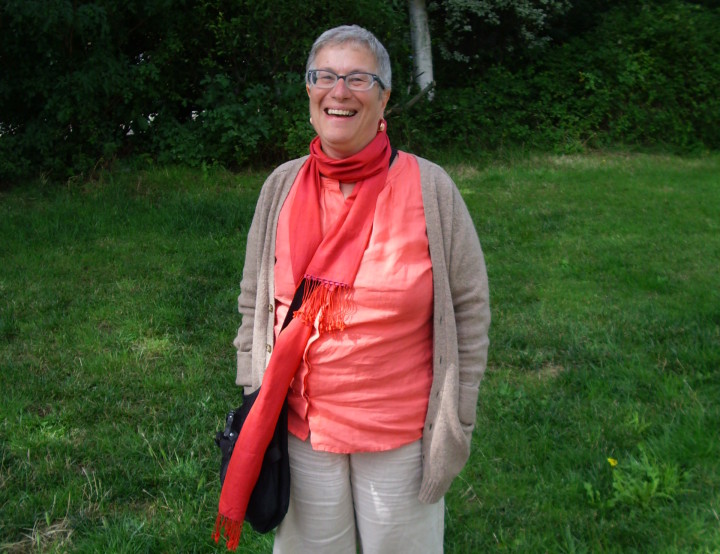Anna has been engaged for many years in the areas of peace and nonviolence, coordinating a commission on these subjects for the European Region of the Humanist International (at the kick off meeting in 2003 in Prague and presenting the final report in 2004 in Budapest) and then continuing this work in Forums in Lisbon (2006) and in Milan (2008). In 2009 she took part in the world coordination team of the World March for Peace and Nonviolence and today she is a member of the international humanist organism, World without wars and violence.
You have followed closely the outburst of the Greek public debt crisis since the beginning and had the opportunity to visit Greece on different occasions. What is your impression of how the people of Greece have lived the development of this situation?
I perceived a great hope with Syriza’s victory in January and the following anti-austerity positions taken by Tsipras and Varoufakis. The possibility to finally be able to protest without being attacked with tear gas by the police was also something positive I noticed in the first months of this year.
How are the Italian media presenting the effort that began in February until the referendum regarding the Greek public debt crisis considering that a private debt was transferred to the general population?
The general position was a repetition of the Troika mantra: you must pay the debt and respect your obligations as a member of the European Union. You received a lot of money and now you have to give it back. The possible Grexit would be a catastrophe for Greece and a danger for Europe. There was in particular a strong campaign against Varoufakis, attacked as an irresponsible and unreliable minister who made absurd proposals. Sometimes there were also some weak voices that defended the position of the government and admitted that years of austerity had not worked and instead produced a terrible poverty in the country.
What is the general impression right now in Italy concerning the way that the European Institutions dealt with the result of the referendum of the 5th of July? What is your personal impression about it?
The mainstream media were satisfied that Tsipras had finally “seen the light” and accepted his obligations towards Europe, avoiding the nightmare of an exit from the Euro. On the other hand, many people who had been happy for the example of courage and dignity given by the Greek people with the victory of the No campaign in the referendum were disappointed and confused. For me it was a big shock; perhaps I was being naïve. I did not imagine the brutality the European institutions were ready to adopt to destroy the dangerous example represented by a country that rebelled against austerity.
How do you explain the fact that in the Greek elections in September and in the recent elections in Portugal the percentage of abstentions reached and even surpassed 45% of the population?
I imagine people are frustrated and feel their vote is useless, since their aspirations are always betrayed by politicians who don’t represent them.
We have no information here on Italy. The only news is Renzi’s statements. Is there something happening concerning social movements? Could Europe expect something from the political situation in Italy, as for example it expects from Spain in the coming elections?
Renzi’s government is the typical neo-liberal government that pretends to be leftwing and cuts education and healthcare, but never reduces military spending. The most interesting movements are the ones that defend water as a human right and the coalition of associations and parties that oppose the TTIP, but in general I don’t see anything here that could be compared with the Spanish Indignados and Podemos.
One of the things you will do among others during your coming time in Athens and Heraklion will be to give an open speech titled “To illuminate the darkness”. In which way do you think that someone today can try to illuminate the darkness and find ways out of it?
First of all, I think that nobody can do anything alone. The way out will come from the social base and anything that helps people to unite, feel hope and strength is useful. I also think that the Greek situation showed with terrible clarity the role of mainstream media in manipulating reality and launching terrorist campaigns to scare people and defend powerful interests. It’s true, this is a dark moment, but there are also many lights, big and small, that illuminate it: self-organized responses to concrete problems about basic human rights (health, education, housing, jobs and so on), solidarity actions with the refugees, demonstrations and protests all over the world, new points of view about economy and politics. In this sense an independent press agency like Pressenza, specialized in news about peace, nonviolence, non discrimination and human rights has a very important role to play, giving space to all the points of view and experiences that “illuminate the darkness” and helping to create a network among them.
Anna Polo will visit Greece within the following days and among other things, she will give an open speech in Athens (21st October) and another one in Heraklion – Crete (23rd October) with the title: “To illuminate the darkness”.






